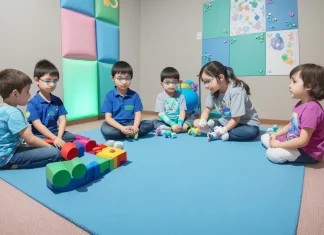A Comprehensive Resource
When it comes to autism, parents play a crucial role in providing guidance and support to their children. Understanding the challenges faced by individuals with autism spectrum disorder (ASD) is essential for creating a nurturing environment and facilitating their development. In this article, we will explore various aspects of autism and provide practical guidance for parents. From early signs and symptoms to educational interventions, communication strategies to managing sensory issues, we’ll cover a wide range of topics to help parents navigate their journey with their autistic child.
Understanding Autism
Autism is a complex neurodevelopmental disorder that affects communication, social interaction, and behavior. Children with autism often exhibit difficulties in understanding and expressing emotions, engage in repetitive behaviors, and have sensory sensitivities. It’s important for parents to have a basic understanding of autism to better comprehend their child’s unique needs.
Early Signs and Symptoms
Recognizing the early signs and symptoms of autism is crucial for early intervention and support. Some common indicators include delayed speech and language development, repetitive movements or behaviors, limited eye contact, and difficulty with social interactions. Early identification can lead to early intervention, which can significantly improve long-term outcomes for children with autism.
Diagnosis and Evaluation
If you suspect your child may have autism, seeking a professional evaluation is essential. Autism diagnoses are typically made by a multidisciplinary team of specialists, including psychologists, speech therapists, and pediatricians. The evaluation process involves comprehensive assessments and observations to determine whether a child meets the criteria for autism spectrum disorder.

Autism Interventions
Numerous interventions and therapies are available to support children with autism. Applied Behavior Analysis (ABA), speech therapy, occupational therapy, and social skills training are some commonly used approaches. It’s important for parents to collaborate with healthcare professionals to create an individualized intervention plan tailored to their child’s specific needs.
Creating a Supportive Environment
Creating a supportive environment is key to nurturing the development of children with autism. This includes establishing routines, providing clear expectations, and incorporating visual aids to aid communication. Additionally, making adaptations to the physical environment and ensuring a calm and structured setting can help reduce anxiety and promote positive behaviors.
Communication Strategies
Communication can be a significant challenge for individuals with autism. Implementing effective communication strategies, such as visual supports, augmentative and alternative communication (AAC) systems, and social stories, can enhance communication skills and foster meaningful interactions between parents and their autistic children.
Social Skills Development
Developing social skills is crucial for individuals with autism to navigate social interactions successfully. Encouraging peer interactions, organizing social activities, and teaching social cues and emotional recognition are essential for helping children with autism build social connections and develop meaningful relationships.
Education and Autism
Finding the right educational setting is vital for children with autism. Individualized Education Programs (IEPs), specialized schools, and inclusive classrooms are some options to consider. Collaborating with educators, advocating for appropriate support, and ensuring access to accommodations can help optimize the educational experience for children with autism.
Managing Sensory Issues
Many individuals with autism experience sensory sensitivities. Understanding and managing sensory issues is essential for creating a comfortable environment. Strategies such as providing sensory breaks, using noise-canceling headphones, and offering sensory-friendly activities can help individuals with autism regulate their sensory experiences.
Nutritional Considerations
While there is no specific autism diet, certain nutritional considerations may be beneficial for individuals with autism. A balanced diet rich in nutrients, including omega-3 fatty acids, antioxidants, and vitamins, can support overall health and well-being. Consulting with a healthcare professional or nutritionist can provide personalized guidance regarding diet and nutrition for children with autism.
Physical Activity and Autism
Engaging in physical activity offers numerous benefits for individuals with autism. Regular exercise can improve motor skills, reduce anxiety, and enhance social interactions. Encouraging participation in activities such as swimming, biking, or dance can provide enjoyable and inclusive opportunities for physical exercise.

Supporting Emotional Well-being
Emotional well-being is a critical aspect of overall health for individuals with autism. Parents can support their child’s emotional well-being by creating a safe and nurturing environment, teaching emotional regulation techniques, and fostering self-esteem and self-advocacy skills. Encouraging engagement in hobbies and activities that bring joy can also contribute to emotional well-being.
Transition to Adulthood
As children with autism grow into adulthood, the transition can bring unique challenges. Planning for the transition early on is crucial. Exploring vocational training options, independent living skills, and social support networks can help ensure a smooth transition to adulthood and promote a fulfilling and independent life for individuals with autism.
Conclusion
Autism Guidance for Parents and Children, Raising a child with autism can present both joys and challenges for parents. By understanding autism and implementing effective strategies, parents can create a supportive and nurturing environment for their children. From early identification and interventions to addressing communication and social skills, this article has provided guidance to empower parents on their journey with their autistic child.
FAQs (Frequently Asked Questions)
- Can autism be cured? Autism cannot be cured, but early intervention and appropriate support can significantly improve outcomes and quality of life for individuals with autism.
- How can I find autism support groups in my area? You can find autism support groups in your area by contacting local autism organizations, schools, or community centers. Online platforms and social media groups can also connect you with relevant support networks.
- What are some educational accommodations for children with autism? Educational accommodations for children with autism can include modified assignments, visual aids, preferential seating, extended time for tasks, and individualized instruction tailored to their learning style.
- Are there alternative therapies for autism? While there are various alternative therapies marketed for autism, it’s important to consult with healthcare professionals and rely on evidence-based interventions supported by scientific research.
- How can I help my child with autism manage meltdowns? Understanding triggers and implementing calming strategies, such as providing a quiet space, using sensory tools, and practicing deep breathing exercises, can help children with autism manage and prevent meltdowns.



























